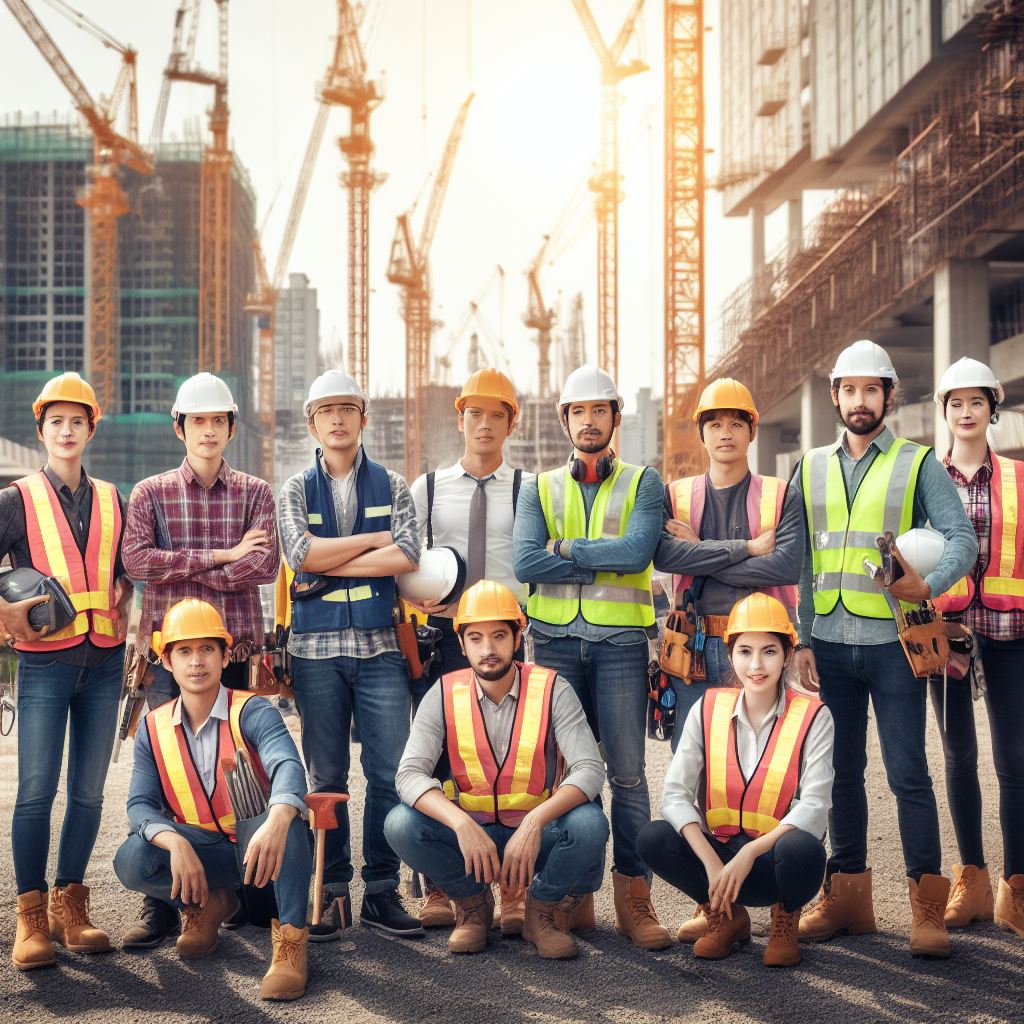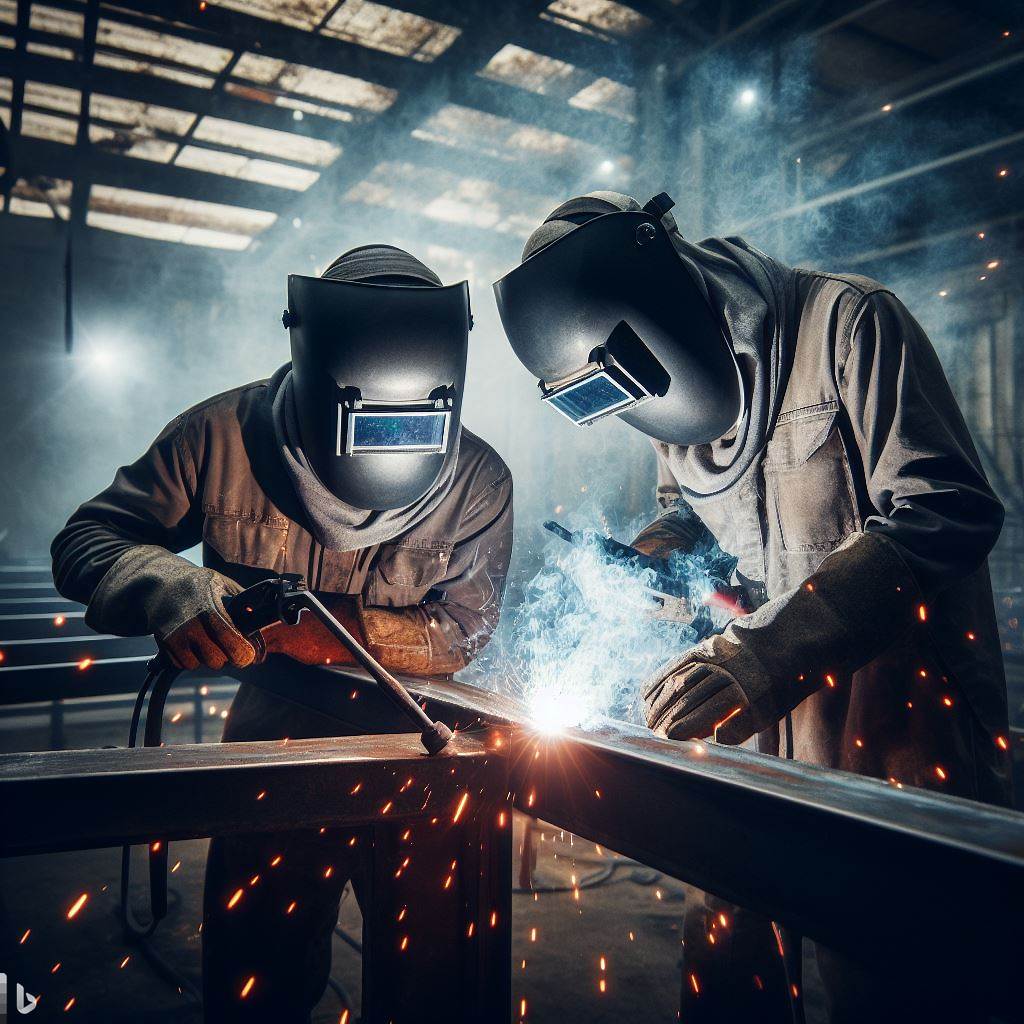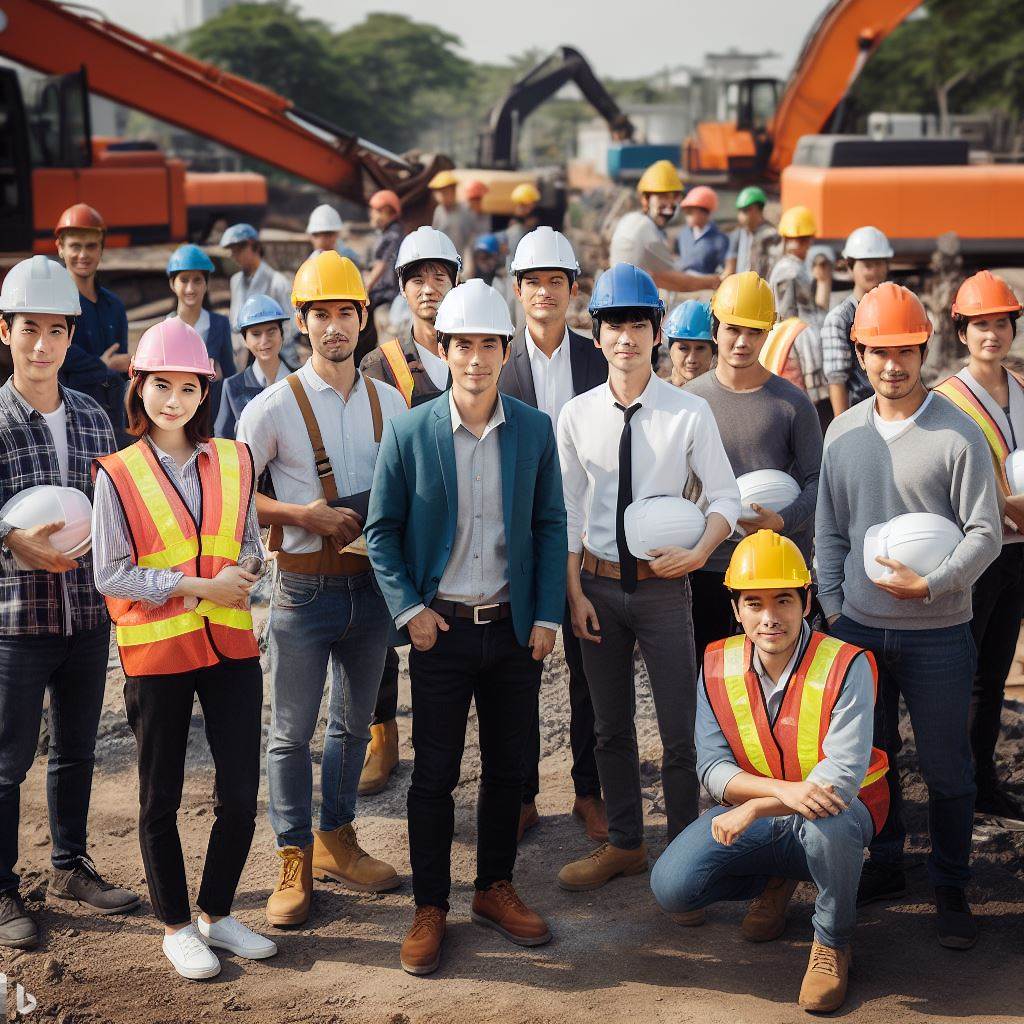Introduction
Understanding the different roles on a US construction site is crucial for a smooth and successful project.
In this blog post, we will provide a brief overview of the various roles involved in construction
Importance of Understanding Various Roles on a US Construction Site
Having a clear understanding of the roles on a construction site is essential for effective communication and collaboration.
It helps ensure that tasks are assigned to the right individuals, leading to better productivity and overall project management.
Brief Overview of the Different Roles Covered in the Blog Post
- Manager: Responsible for the overall planning, coordination, and execution of the construction project.
- Architect: Designs the layout, structure, and aesthetics of the building, collaborating with clients and contractors.
- General Contractor: Oversees the construction process, managing subcontractors, ensuring compliance with regulations, and maintaining safety standards.
- Construction Foreman: Leads the construction crew, supervises daily activities, and ensures that work is completed according to specifications and schedules.
- Structural Engineer: Designs the structural elements and ensures the stability and safety of the building during construction.
- Electrician: Installs and maintains electrical systems, ensuring proper functionality and compliance with electrical codes.
- Plumber: Handles all aspects of plumbing, including the installation and maintenance of pipes, fixtures, and drainage systems.
- Carpenter: Constructs, installs, and repairs wooden structures, such as frameworks, doors, windows, and furniture.
- Mason: Constructs and repairs walls, floors, and other structures using bricks, stones, and concrete.
- Equipment Operator: Operates heavy machinery, such as cranes and excavators, to facilitate construction activities.
Understanding these roles will help individuals gain a comprehensive perspective of the construction industry and appreciate the collaborative efforts required to successfully complete a construction project.
Supervisor Roles
General contractor
A general contractor on a US construction site is responsible for overseeing the entire project.
They are in charge of managing subcontractors, obtaining permits, and ensuring compliance with safety regulations.
Responsibilities and tasks
A general contractor is responsible for planning, budgeting, and coordinating all aspects of the construction project.
They must also ensure that the project is completed on time and within the allocated budget.
Qualifications and experience required
To become a general contractor, one must have a bachelor’s degree in construction management or a related field.
Additionally, several years of experience in the construction industry are necessary to develop the necessary skills and knowledge.
Project manager
The project manager is responsible for the successful completion of a specific construction project.
They oversee all aspects of the project, including planning, budgeting, and execution.
Duties and responsibilities
The project manager is responsible for creating a timeline for the project, allocating resources, and coordinating with subcontractors.
They must also monitor progress, address any issues that arise, and ensure that quality standards are met.
Skills and qualifications desired
A project manager should have excellent communication and leadership skills.
They must also possess a strong understanding of construction processes, as well as the ability to manage budgets and work well under pressure.
Site superintendent
A site superintendent plays a crucial role in overseeing the day-to-day operations on a construction site.
They are responsible for managing the construction team and ensuring that work is completed according to specifications.
Role and responsibilities
The site superintendent is responsible for coordinating subcontractors, overseeing safety protocols, and resolving any issues that arise during construction.
They must also ensure that the project is progressing on schedule and within budget.
Necessary skills and experience
To be an effective site superintendent, one must have strong leadership and problem-solving skills.
They should also have a thorough understanding of construction processes and possess several years of experience in the field.
In short, the roles of supervisors on a US construction site are vital for the successful completion of any project.
Whether it be a general contractor, project manager, or site superintendent, each position requires specific qualifications, skills, and experience.
By working together, these supervisors ensure that the construction process runs smoothly and efficiently, ultimately delivering quality results.
Read: The Role of Unions in Shaping the Welder Profession in USA
Trades and Specialized Roles
Carpenter
On a US construction site, one of the essential roles is that of the carpenter.
The job description of a carpenter involves constructing, installing, and repairing structures made of wood.
To be a successful carpenter, one needs to possess excellent woodworking skills and knowledge in using various tools and materials.
Electrician
Another important role on a construction site is that of an electrician.
The electrician is responsible for installing, maintaining, and repairing electrical systems in buildings and structures.
Transform Your Career Today
Unlock a personalized career strategy that drives real results. Get tailored advice and a roadmap designed just for you.
Start NowTo fulfill this role, an electrician must possess the necessary certifications and qualifications to ensure proper compliance with safety regulations.
Plumber
A plumber plays a vital role in ensuring the efficient functioning of water and drainage systems on a construction site.
Responsibilities of a plumber include installation, repair, and maintenance of pipes, fixtures, and other plumbing components.
Plumbers must have the necessary skills and certifications to handle different plumbing tasks and ensure compliance with building codes.
Read: Emerging Technologies in Welding: US Industry’s Adaptation

Skilled Laborer Roles
Heavy equipment operator
A heavy equipment operator on a US construction site is crucial for the smooth execution of various projects.
These skilled laborers are responsible for operating and maintaining heavy machinery and equipment required for construction purposes.
Their tasks include operating equipment such as bulldozers, excavators, cranes, and forklifts.
They are tasked with moving materials, digging trenches, loading and unloading equipment, and ensuring the proper functionality of the machinery.
To become a heavy equipment operator, one needs to complete proper training and obtain the necessary certifications.
Training programs teach the operators about the equipment, safety guidelines, and operational techniques.
Additionally, they require certifications such as the National Commission for the Certification of Crane Operators (NCCCO).
Welder
Another skilled laborer role on a construction site is that of a welder.
Welders play a vital role in joining metal parts and fabricating structures required in construction.
Their job entails reading blueprints, operating welding equipment, and using various welding techniques to create secure and robust connections.
Welders must possess an array of skills and qualifications necessary for their role.
These include knowledge of different welding methods, proficiency in using welding tools, and the ability to interpret blueprints accurately.
Moreover, they must have a keen eye for detail to ensure each weld meets the required quality standards.
Concrete finisher
Concrete finishers are responsible for the final stages of concrete construction, ensuring that the finished concrete has a smooth and polished appearance.
Their duties include spreading and leveling concrete, using hand and power tools to create a smooth finish, and applying different surface treatments.
Experience and skills are essential for concrete finishers.
They need to have a thorough understanding of concrete properties and the ability to apply various techniques to achieve the desired finish.
Additionally, they should be physically fit to handle the demanding nature of the job, as it often involves long hours of standing and repetitive tasks.
Skilled laborers such as heavy equipment operators, welders, and concrete finishers play indispensable roles in the success of construction projects.
Their expertise and dedication contribute to the efficient and safe completion of various construction tasks.
As the backbone of any construction site, their collective efforts ensure successful project outcomes.
Read: How to Become a Certified Welder in the United States
Support and Administrative Roles
Construction Estimator
A construction estimator plays a crucial role in a US construction site, tasked with analyzing project requirements, creating cost estimates, and assisting in the budgeting process.
Their responsibilities include estimating material, labor, and equipment costs, reviewing blueprints and specifications, and collaborating with project managers to develop accurate project bids.
Construction estimators need to have a solid educational background, usually with a bachelor’s degree in construction management, civil engineering, or a related field.
Proficiency in construction estimation software, excellent mathematical skills, and strong attention to detail are essential for success in this role.
Safety Officer
The safety officer is responsible for maintaining a safe working environment on a construction site.
Their duties include conducting safety inspections, implementing safety programs, training workers on safety procedures, and ensuring compliance with local, state, and federal regulations.
Transform Your Career Today
Unlock a personalized career strategy that drives real results. Get tailored advice and a roadmap designed just for you.
Start NowTo qualify for this role, a high school diploma or GED is usually required, along with certifications such as OSHA 30-hour construction safety training and first aid/CPR.
Prior experience in construction safety is highly desired, as safety officers need a deep understanding of construction processes, potential hazards, and risk mitigation strategies.
Construction Inspector
Construction inspectors are responsible for ensuring that construction projects comply with building codes, zoning regulations, and contract specifications.
Their tasks include inspecting construction sites at various stages, reviewing construction plans, documenting any non-compliance issues, and providing recommendations for corrective actions.
To become a construction inspector, individuals must possess a high school diploma or equivalent, supplemented by certifications such as Certified Construction Inspector or Certified Building Official.
Attention to detail, strong analytical skills, and knowledge of construction codes and regulations are crucial qualifications for this role.
Basically, the support and administrative roles on a construction site, including the construction estimator, safety officer, and construction inspector, are vital for the successful completion of projects while ensuring safety and compliance.
These professionals bring specific skills, knowledge, and qualifications to their respective roles, contributing to a smooth and efficient construction process.
Whether it’s estimating costs, maintaining a safe working environment, or ensuring compliance, these roles play a crucial part in the overall success of any construction project.
Read: Health and Fitness: Keeping Up with the Demands of Construction.
Conclusion
In this Section, we have explored the different roles that exist on a US construction site.
We have discussed the important responsibilities of a site manager, architect, engineer, and construction worker.
Each role plays a vital part in the successful completion of a construction project.
Collaboration and understanding between these roles are crucial for a smooth operation on construction sites.
Without effective communication and teamwork, projects can face delays and complications.
It is essential for professionals in the construction industry to have a comprehensive understanding of each other’s roles.
By recognizing the importance of collaboration, we can ensure a more efficient and productive construction process.
For those considering a career in the construction industry, exploring these roles can provide valuable insight.
Working in construction offers diverse opportunities where one can make a significant impact in building our nation’s infrastructure.
Whether as a site manager, architect, engineer, or construction worker, each role brings unique challenges and rewards.
Transform Your Career Today
Unlock a personalized career strategy that drives real results. Get tailored advice and a roadmap designed just for you.
Start NowSo, join the construction industry today and contribute to the creation of incredible structures that shape our world.
[E-Books for Sale]
The Big Book of 500 High-Paying Jobs in America: Unlock Your Earning Potential
$19.99 • 500 High-Paying Jobs • 330 pages
Explore 500 high-paying jobs in America and learn how to boost your career, earn more, and achieve success!
See All 500 High-Paying Jobs of this E-Book
1001 Professions Without a Degree: High-Paying American Jobs You Can Start Now
$19.99 • 1001 Professions Without a Degree • 174 pages
Discover 1001 high-paying jobs without a degree! Unlock career tips, skills, and success strategies for just $19.99!




